|
|
|
Sort Order |
|
|
|
Items / Page
|
|
|
|
|
|
|
| Srl | Item |
| 1 |
ID:
029748
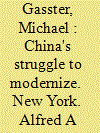

|
|
|
|
|
| Publication |
New York, Alfred A Knopf., 1972.
|
| Description |
xiv, 154p.pbk
|
| Series |
Studies in World Civilization
|
| Standard Number |
0394315049
|
|
|
|
|
|
|
|
|
|
|
|
Copies: C:1/I:0,R:0,Q:0
Circulation
| Accession# | Call# | Current Location | Status | Policy | Location |
| 013356 | 951.033/GAS 013356 | Main | On Shelf | General | |
|
|
|
|
| 2 |
ID:
121032
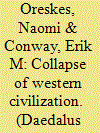

|
|
|
|
|
| Publication |
2013.
|
| Summary/Abstract |
Science fiction writers construct an imaginary future; historians attempt to reconstruct the past. Ultimately, both are seeking to understand the present. In this essay, we blend the two genres to imagine a future historian looking back on a past that is our present and (possible) future. The occasion is the tercentenary of the end of Western culture (1540 - 2073); the dilemma being addressed is how we - the children of the Enlightenment - failed to act on robust information about climate change and knowledge of the damaging events that were about to unfold. Our historian concludes that a second Dark Age had fallen on Western civilization, in which denial and self-deception, rooted in an ideological fixation on "free" markets, disabled the world's powerful nations in the face of tragedy. Moreover, the scientists who best understood the problem were hamstrung by their own cultural practices, which demanded an excessively stringent standard for accepting claims of any kind - even those involving imminent threats. Here, our future historian, living in the Second People's Republic of China, recounts the events of the Period of the Penumbra (1988 - 2073) that led to the Great Collapse and Mass Migration (2074).
|
|
|
|
|
|
|
|
|
|
|
|
|
|
|
|
| 3 |
ID:
134012
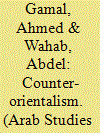

|
|
|
|
|
| Publication |
2014.
|
| Summary/Abstract |
Retranslation is a foundational postcolonial metaphor that might highlight the new horizons of transcultural and transnational relations and their political backdrop. By the same token, Arab-British migrant narratives are of special relevancy to both translation and cultural studies, since migrant identity and writing are closely associated with the politics of translation, rewriting, relocation, and cross-cultural pollination. This contribution explores the role of counter-discourses in general and counter-Orientalism in particular in the contemporary fiction of one of Arab-British writers. In particular, the article focuses on the textual representations of invisible Arab men and women and the East-West cultural exchange in the writing of the Sudanese feminist and Scottish immigrant Leila Aboulela (1964-). Drawing on the counter-traditional concept of translation as engagement rather than transfer, this article attempts to spotlight the aesthetic and political parameters of cultural translation in Arab-British literature represented by Leila Aboulela's The Translator (1999) and Lyrics Alley (2010). Many studies have examined the (mis)representation of Arabs in Western Orientalist narratives, but very few have probed how Arab émigrés have deftly attempted to engage with Orientalist narratives by restructuring new identities and critically hybridizing unexampled cultural models. In other words, counter-Orientalism implies appropriating Orientalist stereotypes of space, history, identity, and gender in counter-narratives that seek to demythologize and therefore de-Orientalize Arab subjects.
|
|
|
|
|
|
|
|
|
|
|
|
|
|
|
|
| 4 |
ID:
018436
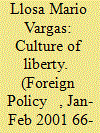

|
|
|
|
|
| Publication |
Jan-Feb 2001.
|
| Description |
66-71
|
|
|
|
|
|
|
|
|
|
|
|
|
|
|
|
| 5 |
ID:
130802
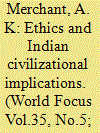

|
|
|
|
|
| Publication |
2014.
|
| Summary/Abstract |
The major civilizations of in human history have been associated with the major religious systems. Some
3,000 years ago Zoroastrianism was the religion of the "glory of ancient Persia," - the Persia that conquered" Babylon, Palestine, Egypt, and the Greek city-states. A few centuries later Judaism was the basis of Hebrew culture, which some philosophers such as Karl Jaspers regards as the greatest in history. And Jewish law has formed the I basis of common law and jurisprudence in countries all over the world. Western culture, until the rise of modem science, was dominated by Christianity. The teachings_ of Islam that burst upon world stage some 1400 years a go preserved and developed the Hellenistic heritage and gave algebra and other sciences. It was probably the greatest civilization the world had seen until the rise of the - Industrial Revolution began to transform Western culture. Today, the tumult of our age of transition is characteristic of the impetuosity and irrational instincts of youth. its follies, its prodigality, its pride, its self- assurance. its rebelliousness, and contempt of discipline.
|
|
|
|
|
|
|
|
|
|
|
|
|
|
|
|
| 6 |
ID:
130827
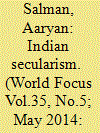

|
|
|
|
|
| Publication |
2014.
|
| Summary/Abstract |
"I believe in a religion based on universal and all-embracing principles which have always been accepted as true by mankind - the primeval eternal an religion, which means that it is above the hostility of all human an creels whatsoever. " - -Swami Dayananda Saraswati. There can be little debate on the In?uence of co Religion on Human History. The overwhelming impact of Christianity, Hinduism, Zoroastrianism, Judaism, or Islam on Civilization is seen not only in the cultural pl: semblance and value system which emerge from their - D2 teachings, but also re?ects in the effects they've had Ul on mankind. un an Believers and Unbelievers alike have acknowledged the profound in?uence of religion on ha individuals, societies and on humanity's collective life. the Religion was and is a power that's here to stay with above both the western and eastern hemispheres! that will On the other hand, Religion was and is still the considered a pariah' by Western Secularism! According are to historian R. Scott Appleby "Religion, at last, can no be longer be ignored". This was one of ?ve "unintended, unforeseen" consequences of 9/ l 1. HI In present day, challenges are manifold both co at domestic and at international level. Most political of con?icts end up passing through the prism of religion» pr. or ethnicity and are claimed to be the trigger factor in cl: many con?icts. The relationship between Religion and special Con?ict is complex.3'And Religion is at the heart of the Secularism Debate as Ethnicity and Religion have been an the building blocks of an lndividua1's Identity. Appleby hi: de?ned religion as 'the human response to a reality m: perceived as sacred
|
|
|
|
|
|
|
|
|
|
|
|
|
|
|
|
| 7 |
ID:
116844
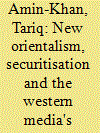

|
|
|
|
|
| Publication |
2012.
|
| Summary/Abstract |
The new Orientalism idea is predicated on the clash of civilisations thesis of Samuel Huntington and others-an outlook which has spread swiftly in Western states since September 11. I explore the implications of the new Orientalism and the assertion of white supremacy for diaspora Muslims in Western societies. Its expression in the media in the form of raced and gendered portrayals and demonised cultural representations of Muslims and Islam, with the accompanying assumption of the superiority of Western culture, is identified here as incendiary racism. This racism also underpins the simultaneous vilification of Muslims and Islam, a claim supported by my analysis of media coverage of the 'niqab debate', terrorism and sports. Thus, at one level, I analyse the Western media's depictions. At another, I examine the consequences of securitisation and the Long War, and critically assess the argument that securitisation has existed from time immemorial and represents nothing new-which leads me to challenge its ahistorical assumptions, and the treatment of the securitiser and the securitised as coeval.
|
|
|
|
|
|
|
|
|
|
|
|
|
|
|
|
| 8 |
ID:
128300
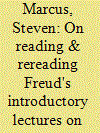

|
|
|
|
|
| Publication |
2014.
|
| Summary/Abstract |
I am going at least at first to write autobiographically. My justification for doing so is that I regard my experience as relatively typical and hence as bearing some fraction of non-negligible, if perhaps oblique, interest. I first read Freud sixty-?ve years ago. I was eighteen years old, and the occasion arose in what was then offered in my intellectually conservative college as a new course. The subject was in the humanities. and it consisted of works selected from some of the many masters of mid- nineteenth- and early-twentieth-century literature and thought. Included among them were such ?gures as Melville, Flaubert. Dostoevsky, Nietzsche. Henry and William James, George Bernard Shaw, I). H. Lawrence. Joyce, Proust, and Kafka. Inserted some- where in the second half of the chronological list was Freud's Introductory Lectures on Psychoanalysis, which he originally delivered between 1915 and 1917.' Hence the context in which Freud was pre- sented, and presented himself, to my largely bewildered late-adolescent sensibility was that of Western cultural, intellectual, and literary modernism. It was an advantage, I believe, to have read him for the first time among other immensely distinguished minds, writers who were in the course of radically departing from what had been generally accepted as canonical forms, conceptions, and conventions of representation - and of norms and values. including the values of civilization and of life itself.
|
|
|
|
|
|
|
|
|
|
|
|
|
|
|
|
| 9 |
ID:
109565
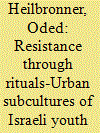

|
|
|
|
|
| Publication |
2011.
|
| Summary/Abstract |
This article discusses secular, Jewish youth, in the urban centers during Israel's initial decades. More specifically, it examines the subcultures of youths who refused to behave according to the behavioral codes enforced by their parents' generation. Young people in these subcultures expressed their resistance to hegemonic norms by means of fashion, style, and certain rituals. It focuses on some manifestations of Israeli youth subcultures in three key periods of Israeli history. 1) The late 1950s and the beginning of the 1960s, when the state was still the dominant element, defining Israeli society and culture. 2) The end of the 1960s and the beginning of the 1970s, when the state and its institutions began to lose their power and Israel as a whole embarked a process of liberalization, involving greater openness to Western culture and a rise in the general standard of living. 3) The end of the 1970s and the beginning of the 1980s, when the liberalization process was accelerated and Israeli society became more pluralistic, with more room for voices and organizations independent of the state.
|
|
|
|
|
|
|
|
|
|
|
|
|
|
|
|
| 10 |
ID:
121995
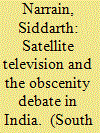

|
|
|
| 11 |
ID:
116624
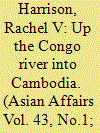

|
|
|
|
|
| Publication |
2012.
|
| Summary/Abstract |
This paper examines the connections between two key Western cultural texts: Joseph Conrad's 1899 novella Heart of Darkness, set in the Belgian Congo; and the Oscar-winning movie Apocalypse Now (dir. Francis Coppola, 1979). The synergies between these two works are viewed through the lens of postcolonial thought, as shaped in particular by the arguments of Edward Said and Chinhua Achebe. The erasure of the native "other" in both novel and film is argued to point to a persistent Western cultural resistance to non-Judeo-Christian, non-Western subjectivities, be they located in Africa, South East Asia or elsewhere. Instead we have a dominant depiction of the native "other" as stereotype (threatening, barbaric, uncivilized), as merged with a dangerous local environment, or as barely present at all.
|
|
|
|
|
|
|
|
|
|
|
|
|
|
|
|
|
|
|
|
|